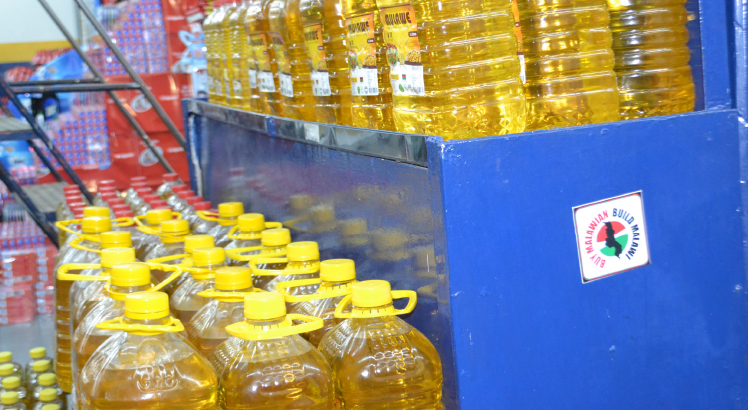Revitalise oil industry to promote industrialisation
It is said that there is an opportunity in adversity. The unfortunate war between Russia and Ukraine can provide an opportunity for local oil farmers and manufacturers to capitalise on the shortage of vegetable oil in the international market.
The Russia-Ukraine war worsened a vegetable oil shortage
Before the war, Russia and Ukraine provided about 75 percent of sunflower seed oil, a primary source of cooking oil in many parts of the developing world, including Malawi, to the international market.

Russia’s invasion of Ukraine destroyed that country’s agriculture, preventing harvests and destroying granaries. The war has also made it difficult to move products from Russia to Ukraine into Europe and the wider world. As a result, the supply in the international market has gone down.
The war has compounded a shortage of vegetable oils such as rapeseed oil, soya bean and palm oils caused by droughts in key-producing countries in South America and Canada as well as Typhoon Rai in Malaysia last December, according to the International Food Policy Research Institute (Ifpri).
Considering that vegetable oils are similar and can usually be used interchangeably, the disruptions caused by the Russia-Ukraine war has caused global oil prices to rise across the board as it always happens with substitute products.
Tridge, an international business network that focuses on using data intelligence to promote cross-border trade, said the price of sunflower and its derivatives skyrocketed after Russia invaded Ukraine and is more than 70 percent higher year-on-year.
On its part, Mercy Corps said the price of vegetable oils rose by seven percent between February and June 2022.
Kwacha devaluation may erode competitive advantage
In an earlier interview, local development researcher and analyst Misonzi Gundo also said the 25 percent depreciation of the kwacha could potentially erase the advantage local manufacturers attained by switching from processing oil locally to buying crude oil for refinement from cheaper markets in Asia and South America.
Before the devaluation, importing crude oil was cheaper than processing locally, but it remains to be seen if it will remain so, considering the shortage of vegetable oils caused by droughts in key producing areas and the Russia-Ukraine war.
Perhaps it is time Malawi turns inward and starts producing locally.
An opportunity abounds, but challenges remain
Agricultural entrepreneur, Victoria Mwafulirwa, acknowledges that the supply disruptions in the global market create an opportunity for Malawians, saying: “This is a crisis. It is not going to go away anytime soon. It is, therefore, an opportunity for people or entrepreneurs like myself.”
Malawi University of Business and Applied Sciences associate professor of economics Betchani Tchereni said the economic conditions in the global market create an opportunity for Malawi to “create jobs, rejuvenate the economy and promote local industrialisation” in line with the Malawi 2063, the country’s long-term development plan.
He said processed oil seeds for the local market can provide a viable alternative to tobacco, the country’s main export, considering the declining demand for the so-called green gold on the international market.
He said: “So, we should make sure that before we export soya beans or sunflower oil or any other vegetable oil in their raw form, we should make sure that we process it into cooking oil. It would even be better if we were supplying the cooking oil rather than the raw materials.”
However, Mwafulirwa, the proprietor of Home Industries, a local manufacturing company that produces sunflower oil, says the local farmers face a myriad of challenges such as competition for raw materials from informal vendors and a lack of financing opportunities.
She also said inefficient agricultural systems used by local farmers—using a hoe for production, dependence on rain-fed agriculture and a general lack of storage facilities—lead to low yields, compounding the shortage of sunflower oil seed, a key raw material.
Said Mwafulirwa: “We are still using rain-fed agriculture for production. Why can’t we use irrigation on our farms to have a sustainable source of raw materials like sunflower seed? For us to have a sustainable source of sunflower, we need to grow it in both the rainy and dry seasons.
“And we have not yet mechanised our agriculture. Farmers still use a hole, which is not economically viable. We might have plenty of land, but if we cultivate it manually, we will not be able to maximise the return from that land.”
However, Tchereni urged policymakers to exercise caution when implementing policies to transition Malawian farmers from subsistence to commercial farming.
“If we are transitioning from subsistence agriculture, we must find an alternative for the subsistence farmers. When bringing in mechanisation, we should remember that it is expensive to mechanise small farms. So, all these factors must be considered,” he says.
What are the possible solutions?
Agricultural researchers and local manufacturers have since urged the government to implement policies and strategies that can help alleviate the challenges.
In its policy brief for March 2020, the Mwapata Institute, a local think-tank, urged donors and the Malawi government to shift from narrowly focusing on maize production “to facilitate farmers’ entrance into these markets could help lessen the impact of forthcoming shocks and provide opportunities for growth.”
Concurring with the institute, Mwafulirwa said the government can incentivise vegetable oil farmers by investing in seed technologies and setting minimum prices to protect farmers from exploitative prices in the local market.
“The contracts that we employ with our smallholder farmers work, but they are not as robust and efficient as other contracts. The government, through the ADDs [Agriculture Development Divisions], to apply the same incentives and enforce the law to protect how much oil seed is going out of the country,” she said.
The entrepreneur stressed that revitalising the vegetable oil industry will require a concerted effort from the government, farmers, manufactures and financing institutions to ensure that there is enough support from the production stage through to processing and value addition.





